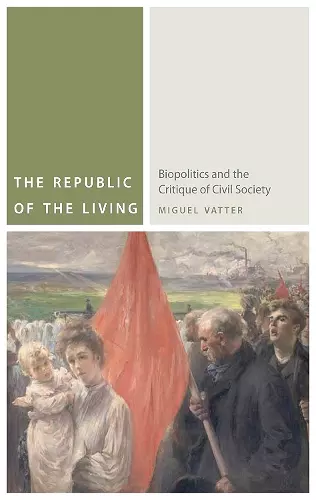The Republic of the Living
Biopolitics and the Critique of Civil Society
Format:Paperback
Publisher:Fordham University Press
Published:15th Jul '14
Currently unavailable, and unfortunately no date known when it will be back

A study of the critical theory of "civil society" from the perspective of post-Foucaultian biopolitics.
Takes up Foucault's hypothesis that liberal "civil society," far from being a sphere of natural freedoms, designates the social spaces where our biological lives come under new forms of control, and are invested with new forms of biopower.
This book takes up Foucault's hypothesis that liberal "civil society," far from being a sphere of natural freedoms, designates the social spaces where our biological lives come under new forms of control and are invested with new forms of biopower. In order to test this hypothesis, its chapters examine the critical theory of civil society—from Hegel and Marx through Lukacs, Adorno, Benjamin, and Arendt—from the new horizon opened up by Foucault's turn to biopolitics and its reception in recent Italian theory.
Negri, Agamben, and Esposito have argued that biopolitics not only denotes new forms of domination over life but harbors within it an affirmative relation between biological life and politics that carries an emancipatory potential. The chapters of this book take up this suggestion by locating this emancipatory potential in the
biopolitical feature of the human condition that Arendt called "natality." The book proceeds to illustrate how natality is the basis for a republican articulation of an affirmative biopolitics. It aims to renew the critical theory of civil society by pursuing the traces of natality as a "surplus of life" that resists the oppressive government of
life found in the capitalist political economy, in the liberal system of rights, and in the bourgeois family.
By contrast, natality offers the normative foundation for a new "republic of the living." Finally, natality permits us to establish a relation between biological life and contemplative life that reverses the long-held belief in a privileged relationship of thinking to the possibility of our death. The result is a materialist, atheological
conception of contemplative life as eternal life.
"In this thrilling intervention into thinking about human life, Miguel Vatter rejects the usual turn towards bios and turns instead (using Agamben, Benjamin and many other interlocutors to do so) towards the physical, the local, and the body in all its vulnerability and desire. In this way the body as fetish can become a means for its own unraveling; a turn towards the body, towards zoe, can mean that the body becomes something other than a site upon which power is exercised (biopower) and become instead a site in which power is experienced, negotiated and often subverted (biopolitics)." -- -James Martel San Francisco State University
ISBN: 9780823256020
Dimensions: unknown
Weight: unknown
416 pages